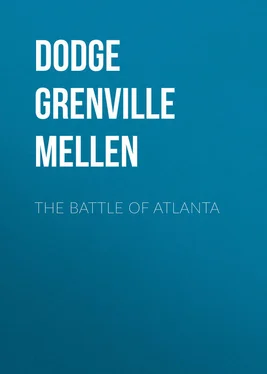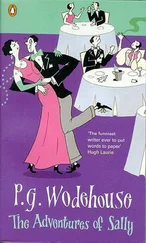Grenville Dodge - The Battle of Atlanta
Здесь есть возможность читать онлайн «Grenville Dodge - The Battle of Atlanta» — ознакомительный отрывок электронной книги совершенно бесплатно, а после прочтения отрывка купить полную версию. В некоторых случаях можно слушать аудио, скачать через торрент в формате fb2 и присутствует краткое содержание. Жанр: foreign_antique, foreign_prose, на английском языке. Описание произведения, (предисловие) а так же отзывы посетителей доступны на портале библиотеки ЛибКат.
- Название:The Battle of Atlanta
- Автор:
- Жанр:
- Год:неизвестен
- ISBN:нет данных
- Рейтинг книги:4 / 5. Голосов: 1
-
Избранное:Добавить в избранное
- Отзывы:
-
Ваша оценка:
- 80
- 1
- 2
- 3
- 4
- 5
The Battle of Atlanta: краткое содержание, описание и аннотация
Предлагаем к чтению аннотацию, описание, краткое содержание или предисловие (зависит от того, что написал сам автор книги «The Battle of Atlanta»). Если вы не нашли необходимую информацию о книге — напишите в комментариях, мы постараемся отыскать её.
The Battle of Atlanta — читать онлайн ознакомительный отрывок
Ниже представлен текст книги, разбитый по страницам. Система сохранения места последней прочитанной страницы, позволяет с удобством читать онлайн бесплатно книгу «The Battle of Atlanta», без необходимости каждый раз заново искать на чём Вы остановились. Поставьте закладку, и сможете в любой момент перейти на страницу, на которой закончили чтение.
Интервал:
Закладка:
Having given an account of the battle fought by Brigadier-General Jeff C. Davis's Division, which occurred the same day, on our left, I will now attempt to give some details of the Elk Horn Battle – the latter having commenced early in the morning. First in order comes a description of the locality near Elk Horn Tavern.
The house is on the Fayetteville and Springfield road, about four miles north of Sugar Creek, between which two points our camp was pitched, on the elevated ridge constituting the northern bank of the creek. Leading north from the tavern, the road drops into the head of the long gorge running towards Keetsville seven miles, known as the "Cross Timbers."
Into the strong fastness north of the Tavern the enemy had obtained a lodgment from 10,000 to 15,000 strong in the rear of our wing, on the morning of the 7th. His strength consisted in part of the following rebel Divisions, as was subsequently ascertained: Frost's, Slack's, Parson's, and Rains's; and the batteries of Ghebor, Clark (six pieces), E. McDonald (three pieces), and Wade (four pieces). There was present also one Regiment of Indians, the whole commanded by General Van Dorn in person, and General Price, who directs the Missouri forces.
Early in the morning, while General Curtis was in consultation with his officers regarding a change of front, consequent on the approach of the enemy on the west of us, news came that the enemy were in close vicinity to the Elk Horn Tavern. The General then immediately ordered Colonel Carr to proceed to effect a dislodgment of the enemy. The formidable numbers present at the time not being known, Colonel Carr directed Colonel Dodge, with the First Brigade of the Fourth Division, to take a position near the Elkhorn Tavern, Colonel Carr accompanying the expedition himself. The point indicated was about a mile and a half distant from our camp, the ground being level and gradually ascending, with open fields on either side of the road, interspersed with an occasional belt of timber.
Colonel Dodge having discovered the enemy in the timber to the right, opened the First Iowa Battery on them, causing considerable execution; two rebels on horseback were seen to fall, and the rest fled. The enemy having fled to the hollow, Colonel Dodge deployed his line, covering as much ground as possible, the Thirty-fifth Illinois being on his left. He sent forward a company of skirmishers from the Fourth Iowa, who soon became sharply engaged with the enemy and the latter opened on us a perfect tornado of round shot, shell, and grape. The Thirty-fifth Illinois became engaged, fighting with determined bravery, and about, this time Colonel Smith was wounded in the head by a shell, which took off a part of his scalp. He also received a bullet in his shoulder, and his horse was shot under him, all about the same time. Just before he was wounded, several ammunition-chests exploded, one after the other, wounding Captain Jones and Lieutenant Gamble, who were standing near Colonel Carr, the latter making a fortunate escape. The explosion of a caisson was terrific.
There was a short lull in the storm of leaden hail, during which time the enemy advanced up the hollow through the brush, along the main road, when Colonel Vandever, who had arrived, ordered forward the infantry. A desperate conflict with small arms ensued. Back rolled the tide of battle, the enemy being driven to the foot of the hill, when he reopened the batteries. Our men fought like heroes; many fell covered with wounds. The latter, when brought to the rear by their comrades, encouraged those who were still breasting the fierce cannonade, by hurrahing for the Union.
Colonel Vandever, in leading forward his brigade, had his horse hit twice, and Colonel Phelps, in the van of his own Regiment, had three horses shot under him. Major Geiger, of the same Regiment, and Captain Hayden, of the Dubuque Battery, had two horses shot under them. Major Coyle, of the Ninth Iowa, was wounded in the leg.
Colonel Dodge having discovered that the enemy were preparing for a general attack, changed his front to the right, covering his men with a log fence, thus compelling the enemy to cross an open field to reach him. Our line was formed and we opened fire with one section of a battery, the other pieces having left the field for want of ammunition. The enemy advanced on our right, left, and center, under cover of a destructive fire, poured in on our works under twelve pieces of artillery. The fighting now lasted over two hours, during which time we held our position; only one Brigade contending against at least six thousand rebel infantry and a heavy bombardment from their artillery, the latter playing upon us at short range. Our men fought like heroes without wincing under the galling fire belching forth from behind trees and rocks, and much of the time from a concealed foe. At one time we were reinforced by three rifled pieces from a German battery, which fired four rounds, and then was compelled to withdraw from the field, being flanked by a Regiment of the enemy.
Colonel Dodge, in order to discover the position of the enemy on his right, directed his firing to cease, when a thousand rebel plush caps and black broad brims popped up into view from the bushes, and, forming, they advanced with great confidence to within one hundred feet of our line. Our men were then ordered to pour in a fire on the dastardly enemy, taking good aim. They were thrown into confusion by our murderous volley and fled.
Their places were filled by a fresh Regiment, and Colonel Dodge, finding that the enemy were outflanking him on the right and that his force was too weak to permit an extension of his line, sent for and soon received a reinforcement of five companies of the Eighth Indiana, which were posted on the right. The firing now became terrific. The enemy annoyed us severely by placing a battery on our left, which completely enfiladed our line. The Fourth Iowa now getting short of ammunition, and the Thirty-fifth Illinois having been forced to give way on the left, it was at this critical time that Lieutenant-Colonel Challenor was ordered to rally his men, who were hurled on the enemy, driving his left back a short distance. Having advanced too far, the Lieutenant-Colonel was surrounded and captured with forty of his men. Our ammunition, as before stated, having given out, we fell back to the open field, maintaining our line of battle in splendid order. The enemy rushed forward with their batteries and entire force. The Fourth Iowa halted, turned on them, and checked for a time their advance until the last round of ammunition was exhausted. General Curtis coming up about this stage of the action, was received with a round of cheers from our boys. The General learning that the ammunition had given out, ordered the Fourth Iowa to fix bayonets and charge on the enemy. The men did so briskly, across the field, but found no enemy.
On Colonel Vandever's front the enemy now commenced swarming up the road and along the gorge, and out of the brush in front of us. Our troops fought them bravely, the officers exposing their persons in leading in front of their men; but we were overwhelmed at this time by superior numbers. We retreated across the field, but rallied again along the fence behind our original position. Upon retiring as above mentioned, reinforcements were seen coming up under General Asboth. In a gallant attempt to resist the advancing column of the enemy, General Asboth received a severe wound in the arm. After the terrible conflict of the day our gallant troops bivouacked in front of the enemy, awaiting the reopening of the conflict in the morning.
Colonel Vandever fought Little's Division. Colonel Dodge's Brigade contended in the morning directly with Rain's and Clark's Divisions, both immediately under the direction of Sterling Price. The latter had his position for some time behind young Clarke's battery.
Читать дальшеИнтервал:
Закладка:
Похожие книги на «The Battle of Atlanta»
Представляем Вашему вниманию похожие книги на «The Battle of Atlanta» списком для выбора. Мы отобрали схожую по названию и смыслу литературу в надежде предоставить читателям больше вариантов отыскать новые, интересные, ещё непрочитанные произведения.
Обсуждение, отзывы о книге «The Battle of Atlanta» и просто собственные мнения читателей. Оставьте ваши комментарии, напишите, что Вы думаете о произведении, его смысле или главных героях. Укажите что конкретно понравилось, а что нет, и почему Вы так считаете.












